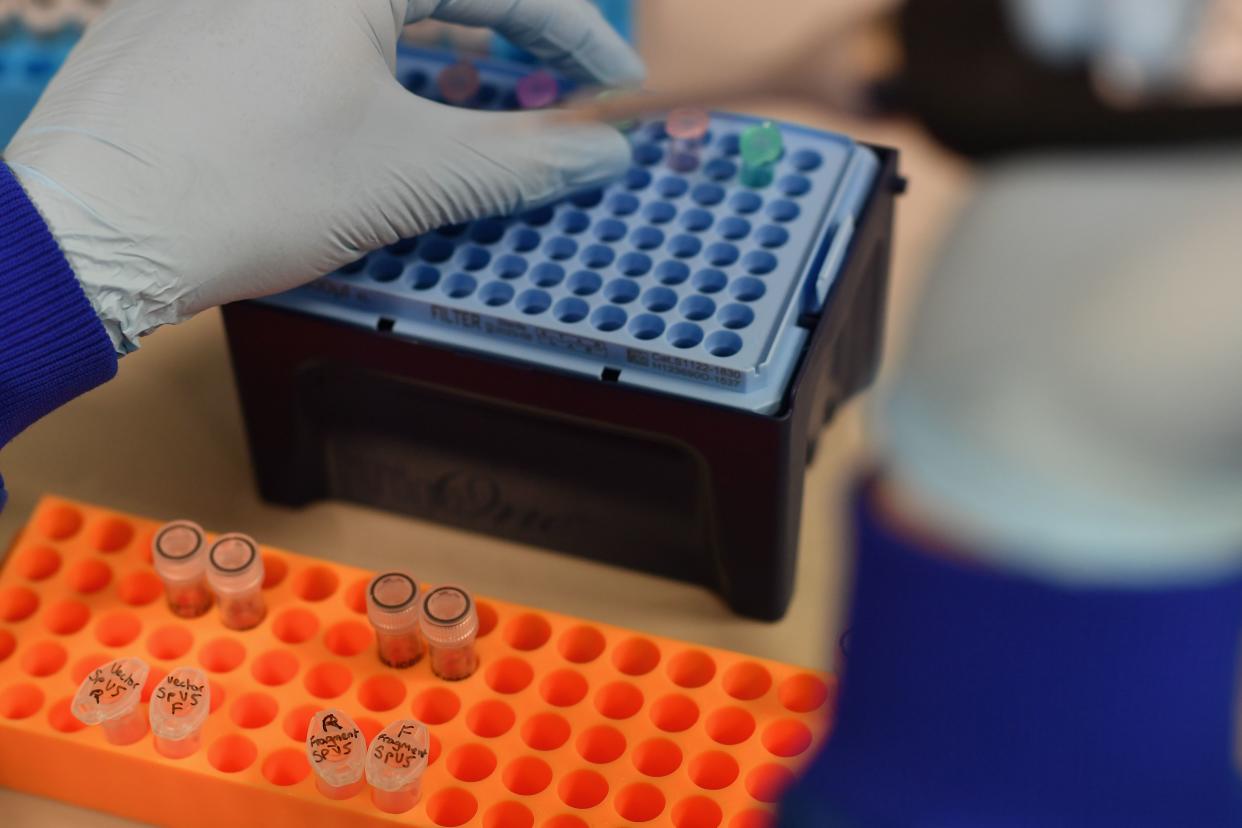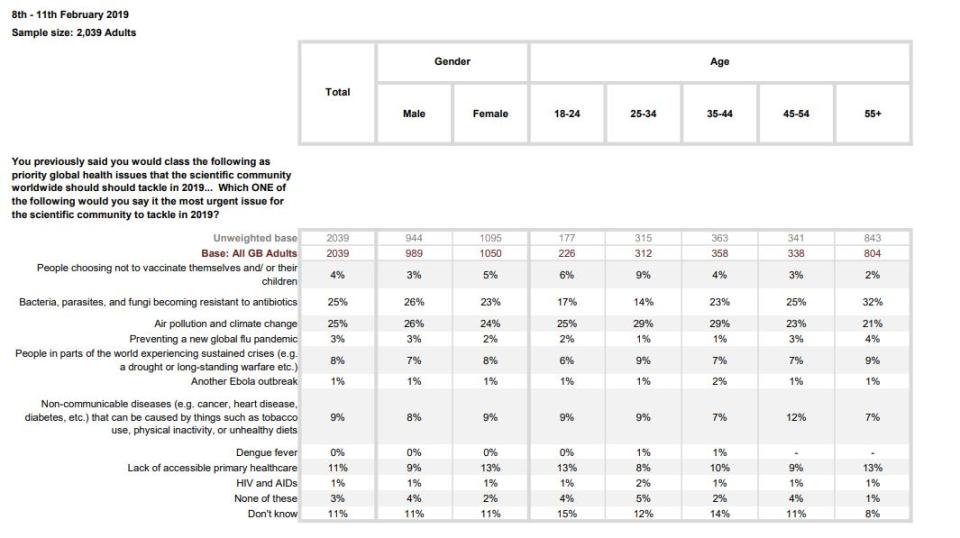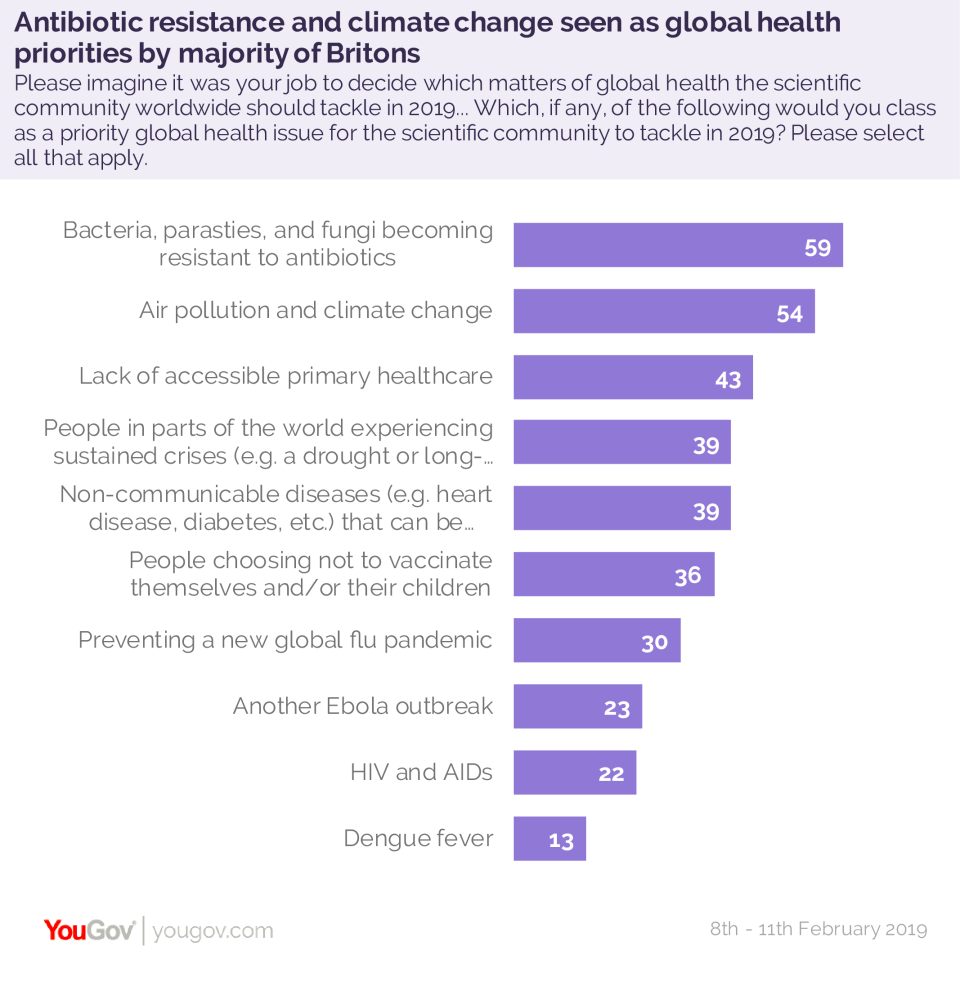The statistic that shows how little Britons worried about a global pandemic last year

Antivaxxers, global warming and concerns about antibiotic resistance were Britons’ main health concerns last year, with just 3% believing that preventing a pandemic was a priority.
A survey carried out in February 2019 found that antibiotic resistance was seen as the most urgent issue for global health.
The survey was conducted before any cases of COVID-19 had been detected or reported.
More than 2,000 people were presented with the World Health Organization’s (WHO) list of global health issues and asked which they personally saw as a priority for the scientific community to tackle urgently.

The most frequently selected issue to prioritise was bacteria, parasites and fungi becoming resistant to antibiotics, which could prevent us from being able to treat diseases such as pneumonia, gonorrhoea, or tuberculosis. Six in ten Britons (59%) classed this as a priority for global health.
The second most voted-for issue was air pollution and climate change (54%), classed by the WHO as the greatest environmental risk to health at the time.
Read more: There may never be a COVID-19 vaccine, warns WHO coronavirus expert
The YouGov poll, in association with Yahoo, revealed that, pre-coronavirus, just 3% of people thought preventing a flu pandemic should be the top priority for scientists. Less than a third (30%) saw it as a priority at all.
The report said: “Health experts do not know when another flu pandemic will hit but are monitoring circulation of viruses constantly to detect pandemic strains.”

In September 2019 a group of prominent international experts issued a stark warning that the threat of a pandemic spreading around the world, potentially killing tens of millions of people, was “a real one”.
The first annual report by the Global Preparedness Monitoring Board, an independent group of 15 experts convened by the World Bank and WHO after the first Ebola crisis, warned there were “increasingly dire risks” of epidemics, but the world was unprepared.

It warned that epidemic-prone diseases such as Ebola, influenza and Sars were increasingly difficult to manage and that the climate crisis, urbanisation and a lack of adequate sanitation and water were breeding grounds for “fast-spreading, catastrophic outbreaks”.
“For too long, world leaders’ approaches to health emergencies have been characterised by a cycle of panic and neglect,” said Dr Gro Harlem Brundtland, former prime minister of Norway and co-chair of the board alongside Elhadj As Sy, secretary general of the International Federation of Red Cross and Red Crescent Societies.
What lessons can we learn from South Korea?
“It is high time for urgent and sustained action. It requires leaders to take proactive steps to strengthen preparedness coordination mechanisms across governments and society to respond quickly to an emergency.”
The British government has been criticised for its handling of the COVID-19 crisis. On Monday lockdown measures were relaxed and some children returned to school, despite warnings from the scientific and medical communities that it was too soon.
Four in ten of those surveyed in the 2019 poll thought that people experiencing sustained crises such as drought, famine, conflict or population displacement should be a global health priority, and a further third (36%) saw people choosing not to vaccinate themselves or their children as a priority issue.
The WHO says vaccination prevents 2-3 million deaths a year and could prevent a further 1.5 million if vaccinations were more common.
Less than one in four saw another Ebola outbreak (23%) or HIV and AIDS (22%) as priority health issues for the scientific community to tackle in 2019.
Coronavirus has so far killed more than 372,000 people worldwide, according to Johns Hopkins University, with more than 6 million confirmed cases. The UK death toll stood at 38,489 on Monday.
Coronavirus: what happened today
Click here to sign up to the latest news, advice and information with our daily Catch-up newsletter
Read more about COVID-19
How to get a coronavirus test if you have symptoms
How easing of lockdown rules affects you
In pictures: How UK school classrooms could look in new normal
How public transport could look after lockdown
How our public spaces will change in the future
Help and advice
Read the full list of official FAQs here
10 tips from the NHS to help deal with anxiety
What to do if you think you have symptoms
How to get help if you've been furloughed

 Yahoo News
Yahoo News 

